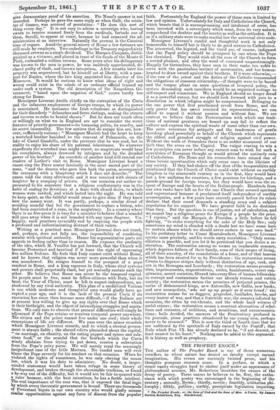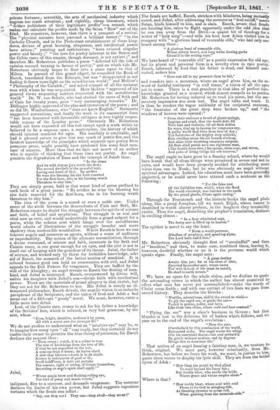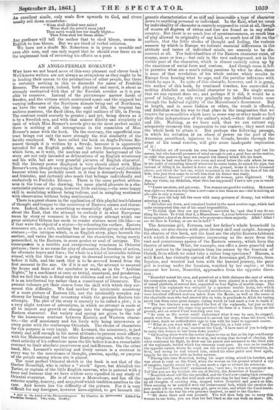THE PROPHET ENOCH.*
THE author of The Prophet Enoch is one of those numerous versifiers to whom nature has denied no faculty except eamnd imagination. His verses are curiously twisted prose, and his thoughts pompous common sense. In a preface, in which a comic vanity struggles hard to shelter itself under an appearance of philosophical acumen, Mr. Robertson describes the causes of the decay of poetry. These causes he believes to be, first, the enthu- siasm with which poetry was encouraged in the beginning of the century ; secondly, Byron; thirdly, novels ; fourthly, utilitarian phi- losophy; fifthly, politics ; sixthly, precipitate legislation impairing • The Prophet Enoch ; or, the Sons of God and the Sons of Ms. A Poem. By June. Burton Robertson, Esq. Blackwood. •• private fortunes ; seventhly, the arts of mechanical industry which –II=too much attention ; and eighthly, cheap literature, which publishers of their legitimate profits"—a remark which 'makes one calculate the profits made by the Scian "Row" out of the flied. He conceives, however, that there is a prospect of a revival. The "physical sciences have pursued a brilliant career ;" "in the Catholic Church, and in the Protestant establishment of these king- doms, divines of great learning, eloquence, and intellectual power have arisen ;" painting and architecture "have evinced singular power and beauty ;" "the love for poetry inherent in the Saxon and the Celtic races of this empire, though dormant, is not extinct ;" and therefore Mr. Robertson publishes a poem "deferred till the tide of
i
opinion seemed turning n favour of poetry," and on which tide Mr. Robertson obviously hopes to float into a place equal to that of Milton. In pursuit of this grand object, he consulted the Book of Enoch, translated from the Ethiopic, but was "disappointed in not finding it throw more light on the antediluvian world ;" and Molitor's "Philosophy of the Cabalah ;" and asked counsel of all the eminent men with whom he was acquainted. Herr Molitor "approved of his general views respecting matters connected with the antediluvian world." Dr. W. von Schutz, who had studied the races of Seth and of Cain for twenty years, gave "very encouraging remarks." Dr.
Dollinger highly approved of the plan and execution of the poem ; and so did Dr. Windischmann, who "does not know English." Steinmetz suggested corrections, and finally the work in its manuscript form "has been honoured with favourable critiques in two highly respec- table organs of the London press." Obviously Mr. Robertson would not have expended all this toil except upon a work which he believed to be a magnum opus, a masterpiece, the history of which should interest mankind for ages. His assiduity is creditable, and had it pleased nature to give him one spark of poetic fire, and the faintest knowledge of the principles which separate epic poetry from pompous prose, might possibly have produced him some faint mea- sure of success. More than that we dare not assert of an author who is capable of thinking that these lines are poetry. An angel predicts the degradation of Esau and the triumph of Jacob thus :
"In the chase
And its wild riotous joys revels the first; The second dwelleth in the peaceful tent, Loving and loved of God. By artifice He wins the blessing his sire bath reserved For the first-born, who in his burning wrath Threatens to slay him."
They are simply prose, bald as that worst kind of prose prefixed to each book of a great poem : "By artifice he wins the blessing his sire hath reserved for the first-born, who in his burning wrath threatens to slay him." The idea of the poem is a sound or even a noble one. tinder
cover of the strife between the descendants of Cain and Seth, Mr. Robertson essays to depict the struggle between the spirits of science and faith, of belief and scepticism. That struggle is as real and vital now as ever, and would undoubtedly form a grand subject for a poem, while the solemn mist which hangs over the antediluvian world admits of illustrations of the struggle broader and more shadowy than modern life would allow. Where Enoch is hero we can tolerate angels and sorcerers as agents, without a sense of unfitness or improbability. The notion of the ultimate reconciliation, through a divine command, of science and faith, incarnate in the Seth and Cainite races, is one great enough for an epic, and the plot is not in itself out of keeping with the grandeur of its theme. Jubal, the father
of science, and wicked only by thirst for forbidden knowledge, asks aid of Enoch, the monarch of the better section of mankind. It is refused because good can hold no communion with evil, and Jabal appeals to the Evil Powers for vengeance. They are baffled by the will of the Almighty ; an angel reveals to Enoch the destiny of man- kind, and Jubal is (destroyed. Enoch, overpowered by divine will, unites his daughter with Jubal's son—divine faith with intellectual power. There are the materials of grand allegory in that sketch, but
they are not for Mr. Robertson to use. His Jabal is simply an ill- tempered philosopher, Enoch drivels, the angelic vision is an imbecile paraphrase of the Scriptures and the union of Irad and Adah a bad scene out of a fifth-rate "goody" novel. We must, however, enter a little more into detail.
Irad, of the Cainite race, comes to ask for his father a knowledge of the Sethites' lore, which is refused, in very bad grammar, by the seer, whose
"Eves, bright, intuitive, undimm'd by years, All with a secret awe the stranger fill."
We do not profess to understand what an "intuitive eye" may be, or to imagine how many eyes " all " may imply, but they certainly do not enable their owner to perceive the true theory of pronouns, for Enoch declines the request thus :
"'thou errest ; youth, it is a crime to tear
The tree of knowledge from the tree of life. If that be not engrafted on the last, A noxious fruit it bears; its leaves distil
A dew that blisters—death is in its shade.
Science is instrument of good or ill; Itself indifrrent, it cloth yet partake The essence, right or wrong, of things themselves, According as mitri's spirit shall apply.'"
Jubal,
"Whose ample brow and flashing-rolling eye,
The lord of poesy and music vouch,"
indignant, flies to a sorcerer, and demands vengeance. The sorcerer declares the limits of his own power, but Jubal suggests ingenious tortures which the fiends can inflict :
"Say, can they not? They can--they shall—they YOST r
The fiends are baffled, Enoch, stricken with blindness, being instantly cured, and -Tubed, after addressing the sorcerer as "foul caitiff," meets Satan, binds himself to him, and is slain. Enoch, aware that fiends are hunting him, takes to flight apparently under the odd idea that be can run away from the Devil—a quaint bit of theology for a writer of "holy song"—and tells his host how Adam visited him in company with "a glorious band of venerable elds," who had only one beard among them :
"A glorious band of venerable elds, Whose silvery beard, and long white flowing garbs Gleam'd in the setting rays."
We have heard of "venerable eld" as a poetic expression for old age, but its plural and personal form is a novelty even in epic poetry. Enoch, Informed by Irad that his father is dead, and himself con- verted, orders him •
"Here rest till to my presence thou be bid," •
and wanders into a mountain, where an ampl gives him, as the re- ward of faithful testimony "in evil times,' a vision of all the ages yet to come. There is a real grandeur in that idea of perfect fore- knowledge granted as a reward, which almost compels us to pardon Mr. Robertson for having induced us to read his poem but the mo- mentary impression was soon lost. The angel talks slid trash. It is thus he renders the vague sublimity of the scriptural sentence, "the fountains of the great deep were broken up," and "the windows of heaven were opened:"
"From their embrace a brood of giants springs, Impious and cruel, that the world cloth fill With lust and violence, till all flesh defiles Its ways, that up to heaven for vengeance cry.
A guilty world God blots from face of day;
The fountains of the mighty deep unlocks, Bids swelling ocean his set bounds o'erleap,
And skies their drowning cataracts outpour. All flesh shall perish save one righteous man, (The fourth from thee,) his spouse, three sons, and wives,
And pairs of living things his ark reserves."
The angel ought to have gone to a Sunday school, where he would have learnt that all clean things were preserved in sevens and not in pairs, and would have been properly scolded for attributing more wives than one to Noah ; but he was obviously an angel without spiritual advantages. Indeed, his education must have been generally neglected, or he could never have uttered such a sentence as the following:
"For the false root Of the forbidden tree, which, when the flood The world o'erswept, was hurried in the earth By the proud giants, Chem again undng."
Through the Pentateuch and the historic books the angel plods along, like a prosy Josephus, till we reach Elijah, whose career is described in words almost profane, in the laughter they irresistibly excite. Thus the angel, describing the prophet's translation, declares.
in swelling climax :
"In a fiery whirlwind rapt, The hairy seer is lifted up to heaven."
The epithet is novel to say the least.
"From a world perverse,
Mindless of prophecy, and speaking signs,
The Lord bath call'd him."
Mr. Robertson obviously thought first of "unmindful" -and then of "heedless," and then, to make sure, combined them, leaving it, however, doubtful whether or no it is the perverse world which speaks signs. Finally, the angel says:
"A great destiny Awaits him yet; for at the close of time,
Escorted by another seer, whose name
Tho' writ in book of life must be untold, He shall to earth return."
We have no space for the whole vision, and we decline to quote the astounding verses in which the author has almost contrived to effect what man has never yet accomplished—make the words of Christ seem feeble ; and with one extract of two lines we pass from sacred history. They describe the Greeks :
"Warlike, advent'rous, skill'd the sword to wield— To ply the rapid oar, or guide the car—
Vaned in genius, polity, and laws,
Me their own clime, where cold and heat contend."
" Plying the oar" was a slave's business in Greece; but that- blunder is the in the delicious bit of bathos which follows, and we
pass on to the end of the angel's revelation :
"Here the seer, Crerwhelm'd by this combustion of the world, Exhausted sinks. The angel waves his wings O'er his convulsed frame—his soul perturb'd
By gentle whisper soothes, lend by degrees
Brings him to conscious life."
That notion of an angel fanning a fainting man, is, we venture to think, original. We must part, however reluctantly, from Mr. Robertson, but before we leave his work, we must, in justice to him,
quote three verses to display his lyric skill. They are from the bridal
hymn of Adah
"How blest the youth by God allied To maid beyond his fancy fair; But doubly blest, who meets the bride, Where grace and virtue empire share."
"How trebly blest, where soul with soul Flows to its God in mingling tide, As blending streams to ocean roll,
When gushing from the mountain-side."
Where is that? Aa excellent simile, only souls flow upwards to God, and rivers usually roll clown mountains:
"When shall divided men unite?
When shall the sever'd races join?
Then earth would lose her deadly blight—
Then Eden shed her bloom divine."
Any gardener will tell the author that to shed bloom, means in raglish to lose bloom. But we are tired of verbal criticism. We have not a doubt Mr. Robertson is in prose a sensible and even able man, and can only regret that he should ever force on us the unpleasant task of reviewing his efforts as a poet.
































 Previous page
Previous page